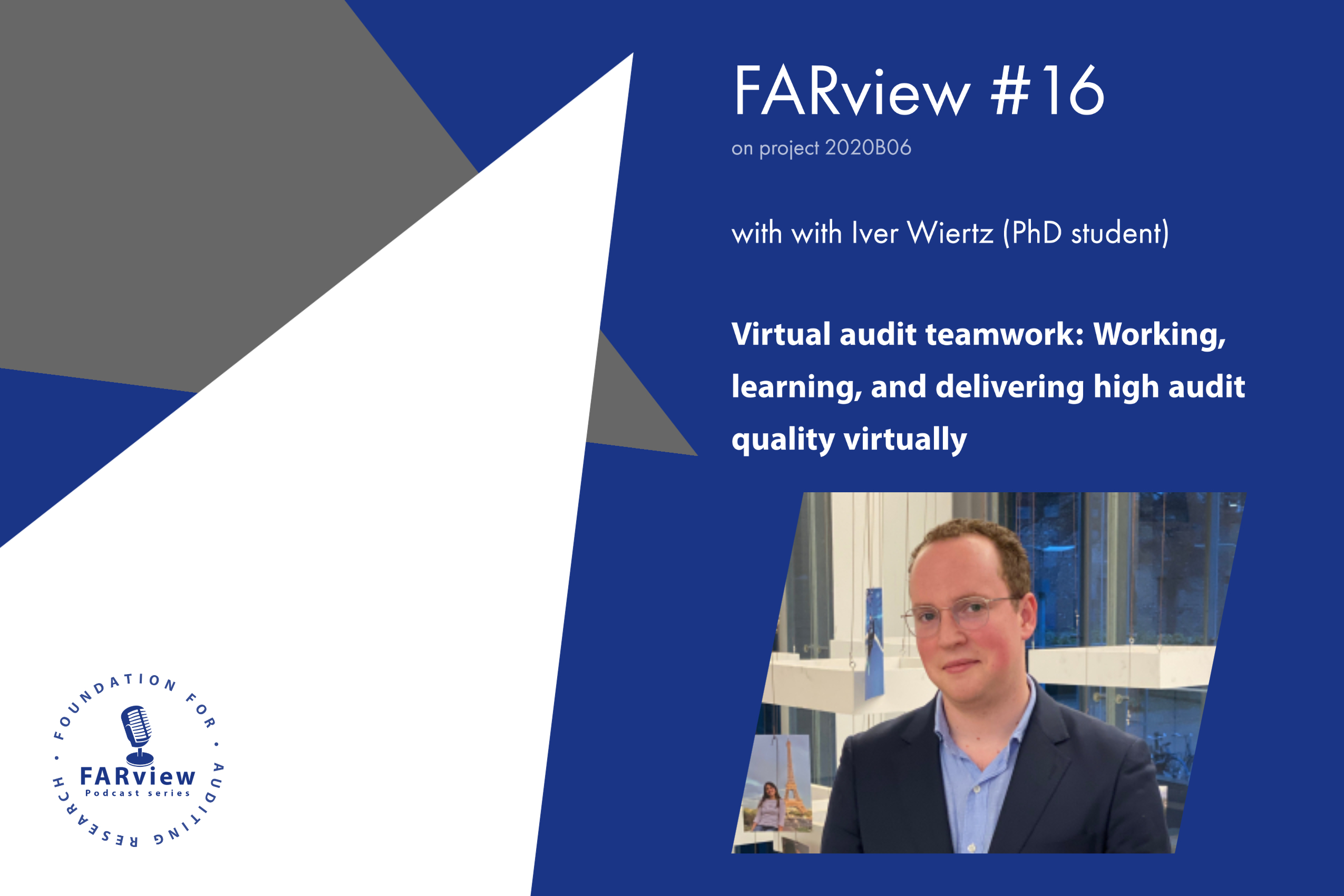Newsletter July 2021
20 July 2021

Want to be the first to know? Then don't forget to follow our LinkedIn page. Did you know that FAR also has a YouTube channel? Here you can find all of the FARview Podcasts.
Latest publications:
- FAR Working Paper on "The imitation behaviors of junior auditors: Does it enhance or hamper audit quality?"
- FAR Literature Review on "Management control in auditing firms and its implications for managing coexisting objectives"
- FAR Literature Review on "Workload allocation process in audit firms"
- FAR Practice Note on "Workload allocation process within audit firms"
Also in this newsletter:
- FAR International Conference 2021 - recordings and presentations online available
- FARview #16 with Iver Wiertz
- FAR contribution to EARNet Conference
- Calls for Research 2021
- Upcoming event – save the date!
Latest publications:
We have a FAR Working Paper available on "The imitation behaviors of junior auditors: Does it enhance or hamper audit quality?", written by Eddy Cardinaels, Kristof Stouthuysen, Evelien Reusen and Viola Darmawan.
Imitation of senior auditors might be a valuable strategy for juniors to learn on-the-job and improve their performance. In this paper, the research team experimentally examines how a senior auditor’s working style (high diligence vs. low diligence) interacts with the nature of the audit firm’s promotion system (superior-based vs. consensus-based) to influence junior auditor judgment by affecting junior auditors’ imitation behavior.
The second publication is a FAR Literature Review on "Management control in auditing firms and its implications for managing coexisting objectives". This publication is written by Sander Tiggelaar, Paula van Veen-Dirks, Sakshi Girdhar and Breda Sweeney.
While many organisations have coexisting goals, this is particularly true for auditing firms as they focus on professional as well as commercial objectives. Many studies find that auditing firms’ management control systems play a key role in the context of managing these professional and commercial objectives. While previous research increases our understanding of the relationship between the management control system and auditor behavior, it typically only incorporates results-based controls (also referred to as output, diagnostic or cybernetic controls) such as the evaluation of financial performance. This stands in contrast to a large body of research which highlights that the management control system in auditing firms focuses relatively strongly on value-based controls (also referred to as socio-ideological or cultural controls) such as common beliefs and informal communication as well as on controls based on mentoring and training.
Third is a FAR Literature Review on "Workload allocation process in audit firms", written by Eddy Cardinaels, Ruiqiong Zhang, Amin Sofla and Simon Dekeyser.
While the allocation of human resources in audit firms is an important research topic, it has received scant research attention to date. Ideally, when audit firms aim at improving audit efficiency and effectiveness, audit firms should properly assign their clients to auditors who manage and lead the engagement team (so-called ‘lead auditors’ in this project) based on the auditor’s expertise level, industry specialization and other relevant factors that benefit audit efficiency and quality. However, lead auditors and clients alike may have their own preferences whereby they try to intervene in the allocation process. These interventions may hamper audit quality and efficiency because other factors than proper matching enter into the allocation process. Prior research on workload allocation mainly focuses on the allocation of audit hours to specific audit engagements across staff ranks and how time pressure related to audit assignments may deteriorate audit quality. Only few studies explore the workload allocation process in terms of assigning clients to lead auditors and the consequences of this assignment for audit quality. Our project focuses on a number of factors related to the allocation of lead auditors within the audit firms.
Our fourth publication is a Practice Note entitled "Workload allocation process within audit firms". This Practice Note is also written by Eddy Cardinaels, Ruiqiong Zhang, Amin Sofla and Simon Dekeyser.
Context: Audit firms rely heavily on their intellectually skilled auditors, who manage and lead the engagement team (so-called ‘lead auditors’ in this project). To deliver high-quality audit services to their clients and to offer opportunity for auditors to learn, audit firms should try to achieve proper matching between their clients and the auditors based on compatibility between them. Appropriate matching can constitute a difficult exercise as both the lead auditors and clients may have an important stake that encourages them to intervene in the allocation process. Such interventions may affect the level of audit quality that the audit firm is able to deliver when clients and auditors are not appropriately matched.
FAR International Conference 2021 - recordings and presentations online available
On Monday 21 June, our annual conference took place online.
The conference consisted of four sessions, with the overarching theme of 'The Human Factor': the human influence that can lead to both improvements and deteriorations in auditing.
The first presentation was by Prof. dr. Ann Vanstraelen and Dr. Ulrike Thuerheimer, about “The auditor’s evaluation of misstatements”. The human factor in their research is about the process of evaluating detected misstatements, during which both auditors and clients are involved. The study provides insight into the value that auditors create.
The second presenter was Prof. dr. Reggy Hooghiemstra . He tries to answer the question “Why some auditors thrive while others struggle”. Although digitalization is becoming an increasingly important part of auditing, it is still people who are responsible. It examines how people work in teams, what challenges they face, how they get to know other team members and how they make the most of their teams for their personal learning curve.
Third up were Prof. dr. Eddy Cardinaels and Dr. Evelien Reusen, who presented their research project on "Imitation behavior of junior auditors: Does it enhance or hamper audit quality?" They emphasized the human factor in auditing: People make mistakes, it is part of human nature.
Last, but not least, Shane Dikolli presented on “CEO behavioral integrity, auditor responses, and firm outcomes”. His research interests focus on the performance evaluation of CEO’s and CEO integrity.
The recordings and the presentations are now available online via the button below.
FARview #16 with Iver Wiertz

In this 16th FARview episode, we talk to PhD candidate Iver Wiertz (Maastricht University) about his PhD thesis "Virtual audit teamwork: Working, learning, and delivering high audit quality virtually".
According to Wiertz, the research offers added value in several areas: "First, we identify where and when virtual teamwork offers opportunities - and possibly threats - to the effectiveness of virtual audit teams.
Second, we provide empirically validated insight into how to successfully exploit the strategic benefits of virtual teamwork and how to avoid risks to audit quality by studying variables that are controllable by the auditor. Finally, we will actively engage with the audit community. In doing so, we will make use of the opportunities that the FAR offers us to share our accumulated knowledge with the participating firms in a way that suits them best".
FAR contribution to EARNet Conference
On 10 and 11 September, the EARNet 2021 conference will be organised. EARNet is one of the important audit research conferences and is being organised this year by the VU - virtually. Anna Gold, Philip Wallage and Kris Hardies are in charge of the central organisation.
Jan Bouwens will lead, on behalf of FAR, a panel discussion on "The Auditability of ESG Reporting". Panel members include Wim Bartels (KPMG), Tjeerd Krumpelman (ABN AMRO), Jan Niewold (EY), Brendan O'Dwyer (University of Amsterdam) and Shiva Rajgopal (Columbia Business School).
In addition, a number of working papers will be presented by FAR researchers:
- Lena Pieper (PhD student in the team of Jere Francis): "What is it about auditors that matters?".
- Bik, Bosman and Bouwens: "Audit Firm Culture and Auditors' Quality Threatening Behavior".
- Leiby, Brazel, Gold, and Schaefer: "Can Audit Committee Support Improve Auditors' Application of Professional Skepticism?"
FAR researchers are also very active in the PhD program, including PhD students James Zhang, Paul Masereel, Iver Wiertz and Tjibbe Bosman.
Tjibbe Bosman will lead the plenary session with his co-authored paper: "Audit Firm Culture, Audit Quality and Office Growth: Multi-method Evidence". Seven of the nine senior faculty members accompanying the PhD conference are also conducting research with FAR (including Robert Knechel, Jere Francis, Justin Leiby and Marleen Willekens).
The FAR "footprint" in science is becoming increasingly clear and we are proud of this.
The program, the registration link, and further information can be found on the EARNet website, see link below via the button.
Calls for Research 2021
Aimed at enhancing knowledge exchange between academia and practice and academically informing practitioners and (public) policy makers in their continuous improvement efforts with regard to the auditing profession, the Foundation for Auditing Research issues two Calls for Research this year (2021):
Call for Empirical Research Project Proposals 2021
This is our regular yearly call for research projects, this year focused on three specific topics, while FAR is also open to empirical research proposals on other research questions and topics within the research objectives and focus set-out in this call. FAR supports research projects that adopt an interdisciplinary approach by using multiple research approaches and methods. Support that FAR will provide for empirical research projects may include, but is not limited to, access to (proprietary and publicly available) archival data and practitioners for survey research, experiments, interviews and field case/event studies of the nine participating Big 4 and Mid-Tier audit firms. FAR empirical research projects generally have a project timeline of one to four years (depending on the scope of the research project) and include a research synthesis at the start and proactive contributions to FAR’s knowledge dissemination strategy such as practice notes, society papers, masterclasses, and conference presentations. Please see the 2021 Call for Empirical Research Project Proposals here:
Special Call for “Thematic Research Program” proposals 2021
With this Call for “Thematic Research Program” Proposals 2021 we invite university auditing research departments and scholars to submit a proposal for a research program geared towards audit research themes that require an interactive dialogue and knowledge exchange between practice and science to develop a coherent series of empirical research projects. A FAR Thematic Research Program should add to achieving FAR’s objectives of stimulating in depth, relevant, and coherent audit quality research, increasing knowledge dissemination, and strengthening the auditing research faculty and community in the Netherlands through support of research financing and data access. The themes that FAR would like to develop over a period of time currently are (1) “Audit quality within the corporate reporting and assurance supply chain (eco system)” and (2) “Audit firm Quality Management Systems and audit quality”. Please see the application criteria, profile, and guidance here:
The application form for both Calls for Research proposals can be found here:
The application deadline for both calls is September 15th, 2021. For further information or questions, please contact FAR at info@foundationforauditingresearch.org
Upcoming event – save the date!
FAR Young Auditing Academic Brown Bag Seminars
On Friday, September 17, from 3:30 - 4:30 p.m. CET, FAR is hosting its next Brown Bag Seminar for Young Academics and Young Pros. Are you part of the target group and would you like to attend as well? Please send an email to info@foundationforauditingresearch.org
Do you have suggestions on how to improve our newsletter or news you would like to share with us? Please let us know by sending an email to info@foundationforauditingresearch.org
Back to overview